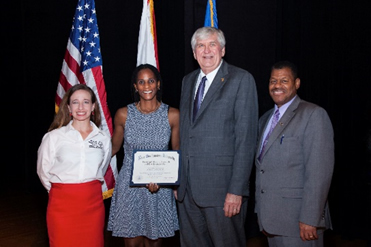Walk 'N Roll: A pilot physical activity program for people with a disability
Grant Winners
- Keiba L. Shaw, PT, D.P.T., Ed.D, MA – College of Health Care Sciences
- Allison Rapp, M.P.H. Keiba L. Shaw, PT, D.P.T., Ed.D, MA – College of Health Care Sciences
- Kathleen Rockefeller, P.T., Sc.D, MPH – College of Health Care Sciences
Dean
- Stanley Wilson, P.T., Ed.D., CEAS – College of Health Care Sciences
Abstract

It is a fact that people with disabilities have poorer overall health, less access to healthcare and lead sedentary lifestyles (Centers for Disease Control [CDC], 2014). Adults with developmental disabilities have higher rates of chronic disease including diabetes and heart disease than those without developmental disabilities. As result, more work is needed to avoid the complications of disease and to improve the quality of life for this vulnerable population. One way to improve the health of these individuals is through an engagement in physical activity. Improvements in cognitive function can be obtained through the enhancement of various neurotransmitters involved in cognitive processing across the lifespan (Ellemberg, St-Louis-Deschenes, 2009). In a systematic review Johnson (2009) found that children and adolescents with developmental disabilities had significant health benefits from participation in group exercise programs, treadmill training, therapeutic riding and to a lesser extent swimming or skiing.
Research Strategy/Methods
The overall design is prospective in nature, with a pre-test post-test repeated measures design. Facilitators will be trained to conduct the program. Baseline measures will be taken. Follow-up measures will be taken at 12 weeks, 24 weeks, 32 weeks and 40 weeks following achievement of the specific Levels in the Program.
Data Collection Tools/Techniques
Study investigators will collect data that will include: 1) Subject demographic information (age, gender, ethnicity), 2) Height/weight/body mass index (BMI), 3) Heart rate (HR), respiratory rate (RR), blood pressure (BP), 4) a subjective rating of exertion, 5) Survey questionnaire about knowledge, skills, and behaviors pertinent to physical activity.
Implications
This study will provide baseline information on the impact of a simple walk or roll program on the health of individuals with developmental and/or intellectual disabilities. It will address the feasibility of training community leaders in implementing a program that will benefit and positively affect the health of these individuals. Results will be disseminated through peer-reviewed journals and presentations at national conferences.